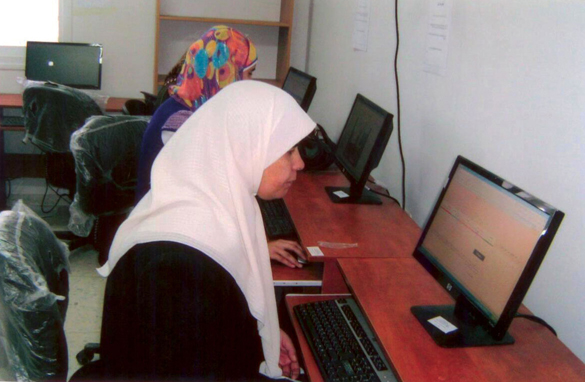
Young woman practices her computer skills at the Tel Youth Club.
Just southwest of Nablus, there is a tradition-bound village of 5,000 called Tel. Men and women remain separated in most of their daily activities. But since The Tel Youth Club received an in-kind award of $25,000 from the U.S. State Department’s MEPI Community Leadership Empowerment Program members say the community is now experiencing a cultural shift.
The shift began in July 2009 when The Tel Youth Club, which doubles as a cultural center, set up a fully functional computer lab complemented by computer training workshops. In the past, the Club’s leadership worked with other Nablus district NGOs to expand its services to include workshops and seminars. Yet, since its establishment in 1971, the club maintained an all-male member status and program focus.
For Tel Youth Club board member and director Muhammad Shtayeh, the change at the Club is radical. Before collaborating with Creative Associates, which manages the MEPI award, the Club faced difficulties attracting women to its activities in response to donors with specific requirements to include women. According to Shtayeh, fellow board members were forced to invite their female relatives to meet donor requirements for utilizing funds. “Creative’s decision to fund a computer lab and skills workshops gave women a reason to attend Club activities,” said Shtayeh.
Now the Club’s leadership is revising its strategy for including more women in Club activities. The all-male board invited two women to attend its meetings. The inclusion of women on the board led to several decisions, including opening the Club from morning to early afternoon for women to use the facilities while their children are in school. The board is also seeking additional funding to establish a fitness center that will cater to women as well as men. For Shtayeh, the Club’s new strategy to include women in its activities is not simply a response to donor demands. He thinks there is a change in the mentality of community members themselves. The opening of the computer lab transformed the club’s makeup from exclusively male to actively co-ed membership.
The Tel Youth Club worked closely with Ms. Itidal Zaydan, director of the Tel Women’s Society, to ensure access to the computer lab to both women and men from Tel’s community. With the influx of girls and women to its facilities, the Club began to accept female members into its ranks. The Club expanded from 300 male members to now include 30 female members. Its culture also underwent a shift from segregation along gender lines to being socially interactive and inclusive of both sexes. This change in culture is so pronounced that Shtayeh is considering changing the name of the club from Nadi Shabab Tel—
Tel Youth Club—to Nadi Shabab wa Shabat Tel —Tel Young Men and Women’s Club.
Ms. Zaydan is committed to encouraging more girls and women to join the club and will attend its board meetings. “As long as they are active and have the computers, I won’t leave them,” Ms. Zaydan says. “I have the right to be there.” The club’s move to change its name and the cultural shift are bringing about the first co-educational youth club in Tel. As a result of the cultural change, a USAID-funded project in the vicinity approached the Club board regarding a mixed computer training class. Already, more than 80 girls and boys in the 9th and 10th grades have applied. Of these, the applications of 15 girls and 15 boys were accepted and the group will, emphasizing the cultural shift underway, be trained together.
— Shahnaz Jubran